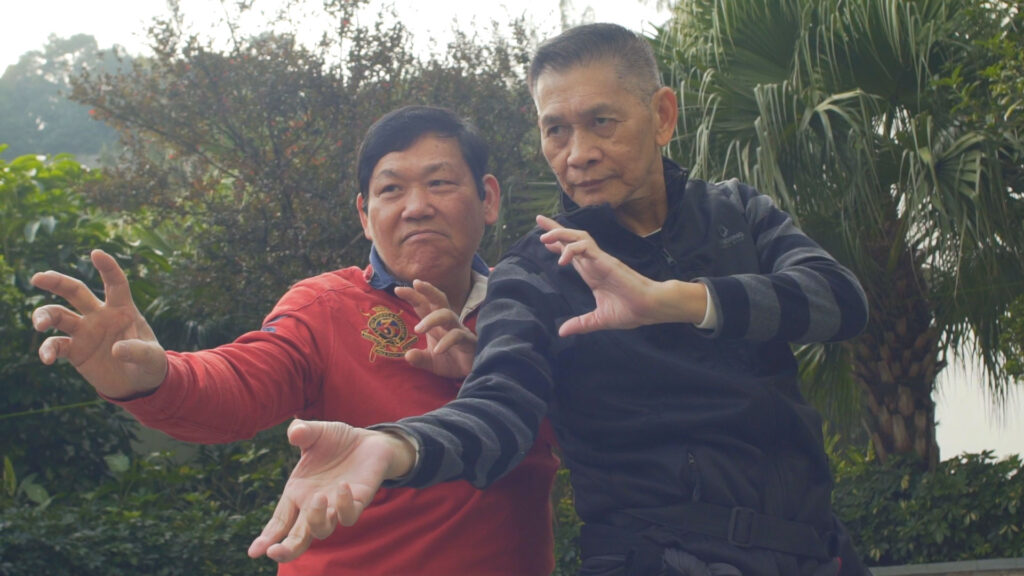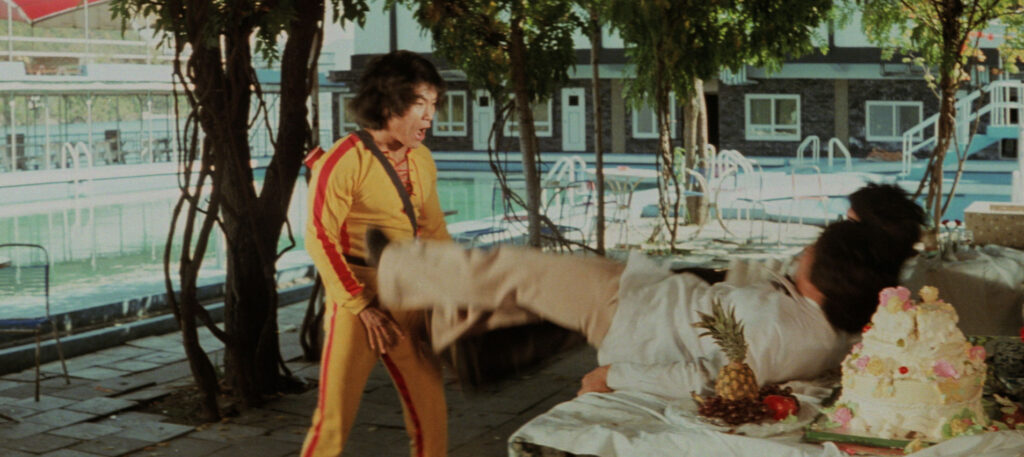Andre Morgan, Angela Mao, Bruce Lee, Bruce Li, Bruce Liang, Bruceploitation, Caryn Wade, Casanova Wong, David Chiang, documentaries, Dragon Lee, Enter the Clones of Bruce, Eric Tseng, Godfrey Ho, Ho Chung-tao, Lee Chiu, Lo Meng, Long Ko, Mars, Michael Worth, Mike Leeder, Moon Kyung-seok, movies, Phillip Ko, reviews, Ron Van Clief, Roy Wade, Sammo Hung, Stephen Nogues, Tribeca Festival, Tribeca Film Festival, Valerie Sou, Yasuaki Kurata
June 13, 2023
by Carla Hay

Directed by David Gregory
Some language in Cantonese, Mandarin and Korean with subtitles
Culture Representation: Taking place primarily in Hong Kong, the documentary film “Enter the Clones of Bruce” features a predominantly Asian group of people (with some white people and one African American) discussing how the legacy of martial-arts actor Bruce Lee spawned imitators and a low-budget action films that have some connection to Lee’s history and persona.
Culture Clash: Many actors who became known as Bruce Lee knockoffs experienced exploitation and typecasting.
Culture Audience: “Enter the Clones of Bruce” will appeal primarily to people who are fans of Lee and action movies inspired by him.

“Enter the Clones of Bruce” is a breezy and fascinating deep dive into Bruce Lee-inspired movies and actors who tried to continue the legacy of Lee after his tragic death. The movie’s commentary is superb and includes some people who rarely give interviews. Martial-arts star Lee died of a cerebral edema in 1973. He was 32 years old. This documentary explores how far-reaching his influence was by showing how Bruce Lee imitators and ripoffs flooded the movie industry after his death.
Directed by David Gregory, “Enter the Clones of Bruce” had its world premiere at the 2023 Tribeca Festival. The documentary shows how the enduring popularity of Lee helped fuel a renaissance of Hong Kong-based filmmaking in the 1970s and 1980s. Shaw Brothers Studio, a Hong Kong-based film company that existed from 1925 to 2011, is mentioned frequently in the documentary as the biggest generator of Bruce Lee imitation movies. Although Lee was an American who was born in San Francisco, his parents were from Hong Kong, and they raised him there shortly after he was born. He maintained homes and had dual citizenship in the U.S. and Hong Kong.
Lee’s breakthrough to international audiences was co-starring as Kato in the American superhero TV series “The Green Hornet,” from 1966 to 1967. Movie stardom soon followed. Lee’s best-known films are 1971’s “The Big Boss,” 1972’s “Fist of Fury,” 1972’s “The Way of the Dragon” and 1973’s “Enter the Dragon,” which remains his biggest hit movie. Lee died six days before “Enter the Dragon” was released on July 26, 1973.
“Enter the Clones of Bruce” makes a case in proving that Lee’s sudden and unexpected death left a void that others rushed to fill in the 1970 and 1980s. The overall mindset was that people believed Lee would have soared to even greater movie-star heights if he had lived. Why not make the types of movies that he would have made if he had been alive? In addition to action flicks with fictional Bruce Lee-inspired characters, there were numerous sequels, prequels and spinoffs to biopics about Lee.
The documentary doesn’t sugarcoat that most of the imitation Bruce Lee movies and imitation Bruce Lee actors were fueled by greed. In the documentary and elsewhere, it’s called Bruceploitation. But many of those involved in Bruceploitation also had genuine admiration for Lee and wanted to continue his legacy in some way. A lot of Bruceploitation merchandise came out of this era, but “Enter the Clones of Bruce” focuses mainly on the Bruceploitation movies and the people who made them.
One of the best aspects of “Enter the Clones of Bruce” is how the movie has an impressive array of interviews with people who were involved with or are experts in Bruceploitation. It’s obvious that the documentary filmmakers took a lot of time and care in tracking down many of these people, in order to make the documentary as complete as possible. Although this low-budget movie’s film editing and other production values are little rough around the edges, the documentary’s research is impeccable, while the narrative is easy to understand.
Almost all of the best-known Bruce Lee-inspired, low-budget actors from the 1970s and 1980s are interviewed in the documentary. Bruce Li (real name Ho Chung-tao), who is originally from Taiwan, comments in the documentary about his Bruce Lee-like persona: “It was really a gimmick.” Li starred in movies such as 1975’s “Dragon Dies Hard” and 1976’s “Bruce Lee: The True Story,” also known as “Bruce Lee: The Man, The Myth.” In the documentary, actor/writer Eric Tseng says that Li was good at what he did, but Li’s career would have been better if he hadn’t been typecast as a Bruce Lee imitator. Li says in the documentary that he didn’t think he ever really looked like Bruce Lee.
Dragon Lee (real name: Moon Kyung-seok), also known as Moon Lee, is a native of South Korea. Just like Li, Dragon Lee relocated to Hong Kong for his Bruceploitation career. Dragon Lee says that he met with Bruce Lee’s widow Linda to consult with her about how to portray Bruce. Dragon Lee also says that Bruce Lee’s signature move of thumbing his nose mainly came from a need to wipe sweat from his face. Dragon Lee’s Bruceploitation movies include 1976’s “The Real Bruce Lee,” 1978’s “Enter Three Dragons” and 1981’s “The Clones of Bruce Lee.”
Bruce Le, whose heritage is Chinese, grew up in Macau as a refugee from Burma. He moved to Hong Kong for the Bruce Lee phase of his career. Le, who was a contract player for Shaw Brothers, says of movie producer Bruce Randall, who was behind many Bruceploitation films: “He was like my godfather.” Le’s film credits include 1976’s “Bruce’s Deadly Fingers,” 1977’s “Return of Bruce” and 1977’s “Bruce and the Shaolin Bronzemen.” In archival footage from a TV talk show interview, Le is shown making the far-fetched claim that he drinks snake blood to stay strong.
“Enter the Clones of Bruce” also includes interviews with two martial-arts actors whose careers flourished because of Bruce Lee’s legacy but who aren’t Asian men: Angela Mao, who retired from acting in the 1990s, was considered the “first lady of kung fu” during her heyday movie career. In a rare interview for a documentary, Mao says of how Bruce Lee impacted her life: “I’m very grateful to him.” Meanwhile, Ron Van Clief (who is African American) tells the story in his documentary about how Bruce Lee was the one who gave Van Clief the nickname the Black Dragon.
Other actors interviewed in the documentary include Bruce Liang, Sammo Hung, Lo Meng, Casanova Wong, Eric Tseng, Caryn Wade, David Chiang, Long Ko, Roy Wade, Yasuaki Kurata, Phillip Ko and Mars. Bolo Yeung (also known as Yeung Sze), who is from Hong Kong, is described in the documentary as the actor who did more Bruceploitation movies than anyone else. Yeung isn’t interviewed in the documentary, but his son David Yeung has a short interview clip in the film.
Experts interviewed in “Enter the Clones of Bruce” include Mike Leeder, a Hong Kong expert who has some of the most insightful commentary in the film; Valerie Sou, professor of Asian studies at San Francisco State University; “Bruceploitation Bible” author Michael Worth; and “Fists of Bruce Lee” author Stephen Nogues. Nogues is from France, which is mentioned along with the United States, as the biggest markets for Bruceploitation outside of Asia.
It’s mentioned that many of the Bruceploitation actors were exploited themselves by having to work extremely long hours in non-union jobs, often while injured. Several of the Bruceploitation actors interviewed in the film say that the contracts they signed did not include getting royalties from the movies that they made. In other words, if people got rich from these Bruceploitation films, they weren’t the actors who starred in these movies.
Jackie Chan is mentioned as a next-generation beneficiary of Bruce Lee’s legacy. Unlike the Bruceploitation actors, who portrayed skilled action characters in all of their movies, Chan created an action-hero persona where his character often bumbled his way through fights that he lost until the very end when his character would emerge victorious. As for other action stars directly influenced by Bruce Lee, there is curiously no mention in the documentary of Chuck Norris, whose work with Bruce Lee kickstarted Norris’ career.
The filmmakers interviewed in the documentary include director Godfrey Ho, director Lee Chiu and producer Andre Morgan. Morgan is formerly an executive with Golden Harvest Films (now known as Orange Sky Golden Harvest Films), a company that co-produced several Bruce Lee films, including “Enter the Dragon” and 1978’s controversial “Game of Death.” The movie was controversial because it promised more than it delivered in unreleased Bruce Lee footage. In “Enter the Clones of Bruce,” Morgan doesn’t deny how disappointing “Game of Death” is to many Bruce Lee fans, but Morgan makes no apologies for it either.
There are two different versions of “Game of Death,” both of which cobbled together unreleased footage (about 15 minutes) of Bruce Lee and substituted other actors in scenes that were supposed to have the Billy Lo character portrayed by Bruce Lee. The quality of the filmmaking in “Game of Death” is so low, a cardboard cutout of Bruce Lee’s face was used over another actor’s real face in one of the scenes. Many scenes were badly lit and had terrible film editing. Numerous fans have complained that “Game of Death” is an insult to Bruce Lee instead of it being the fitting tribute to Bruce Lee that it should have been.
Morgan insists in the documentary that there is no hidden Bruce Lee movie footage anywhere that could be released in another movie. Based on everything shown in this documentary, if any of that footage existed, then it would have been exploited and re-exploited years ago. Although there’s no secret treasure trove of Bruce Lee archival movie footage, “Enter the Clones of Bruce” is a gem of a documentary for any fans of Bruce Lee and martial arts films.
UPDATE: Severin Films will release “Enter the Clones of Bruce” in select U.S. cinemas with a tour that begins in Los Angeles on April 12, 2024. The movie will be released on digital and VOD on April 30, 2024, and on Blu-ray on May 21, 2024.
